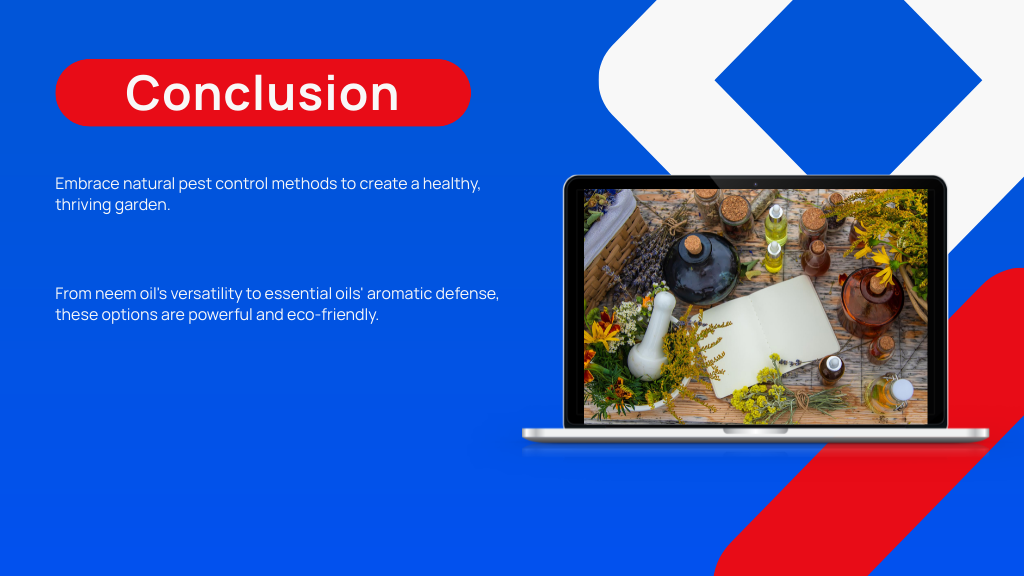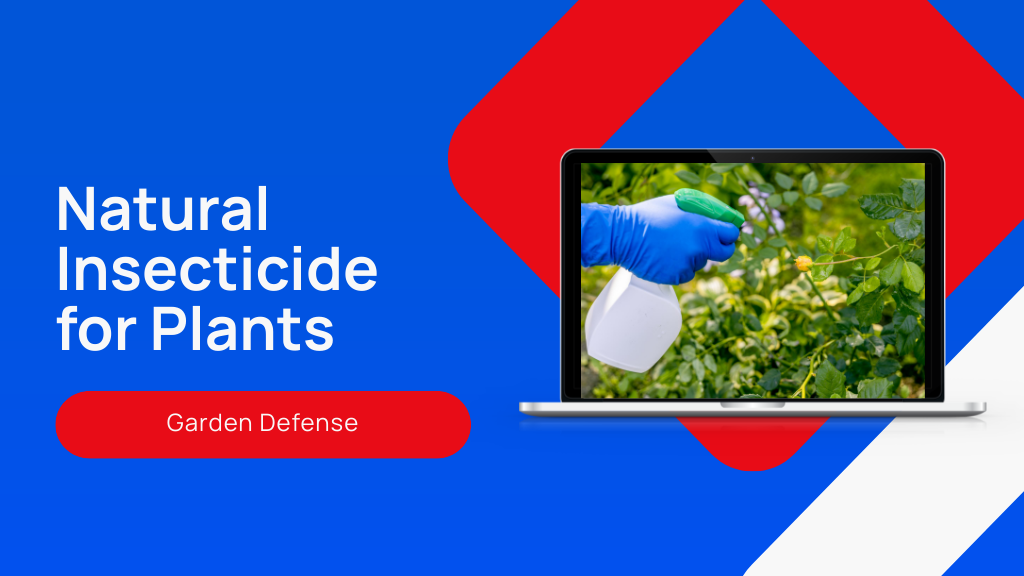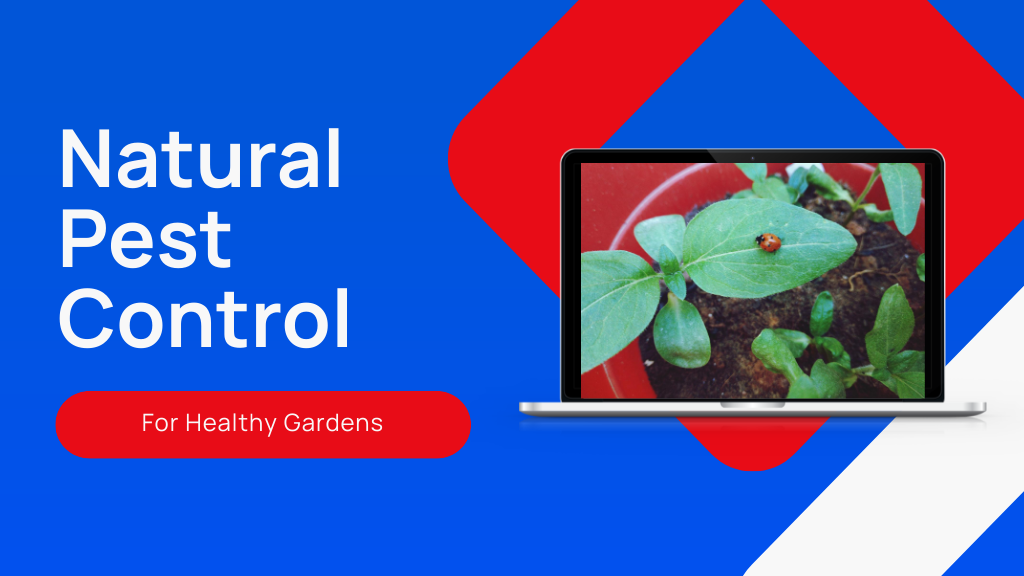
You can keep your garden thriving with natural solutions like neem oil, which targets pest life cycles harmlessly. Diatomaceous earth and garlic spray offer mechanical and repellent defenses, respectively, while pepper spray uses capsaicin to deter pests. Soap spray and Bacillus Thuringiensis (Bt) are great for handling a variety of insects, and essential oils provide a pleasant scent with pest control benefits. Explore these options further to enhance your garden's health and sustainability.
Neem Oil: A Versatile Natural Pesticide
While you may be searching for effective ways to protect your plants, consider neem oil, a natural pesticide renowned for its versatility. Extracted from the seeds of the neem tree, this oil acts as a powerful natural insecticide for plants.
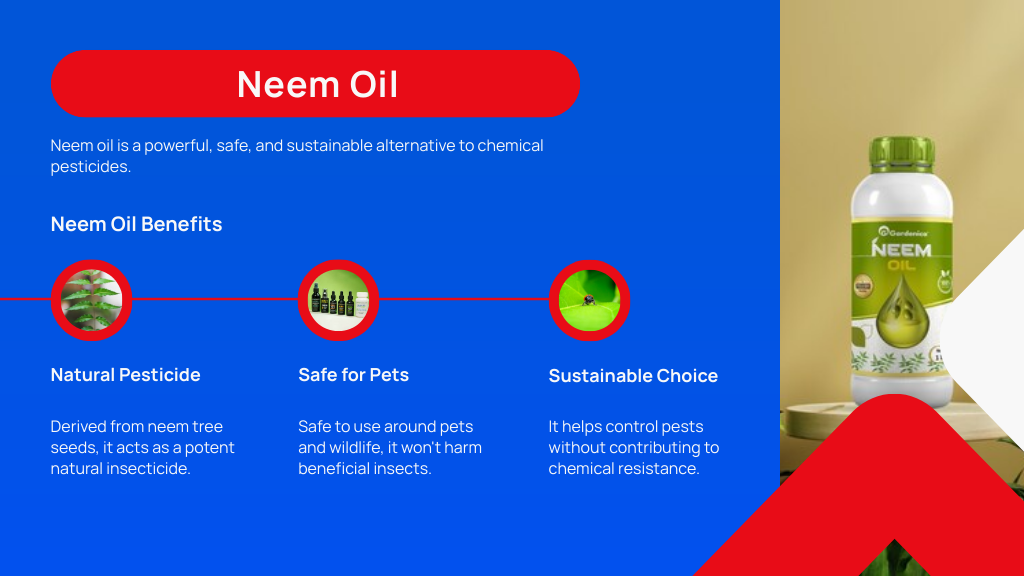
Explore the natural power of neem oil, an effective and versatile pesticide derived from neem tree seeds.
It's safe to use around pets and wildlife, and it won't harm beneficial insects when applied correctly. You'll find that neem oil effectively controls aphids, mites, and other pesky critters by disrupting their life cycle.
It's a sustainable choice that doesn't contribute to the buildup of chemical resistance in pests. You can apply it directly to foliage, ensuring thorough coverage to maximize its efficacy.
Embrace neem oil as a cornerstone in your garden care routine for healthier plants and a cleaner environment.
Diatomaceous Earth: Mechanical Pest Control
As you explore using diatomaceous earth for pest control on your plants, understanding the correct application techniques is essential.
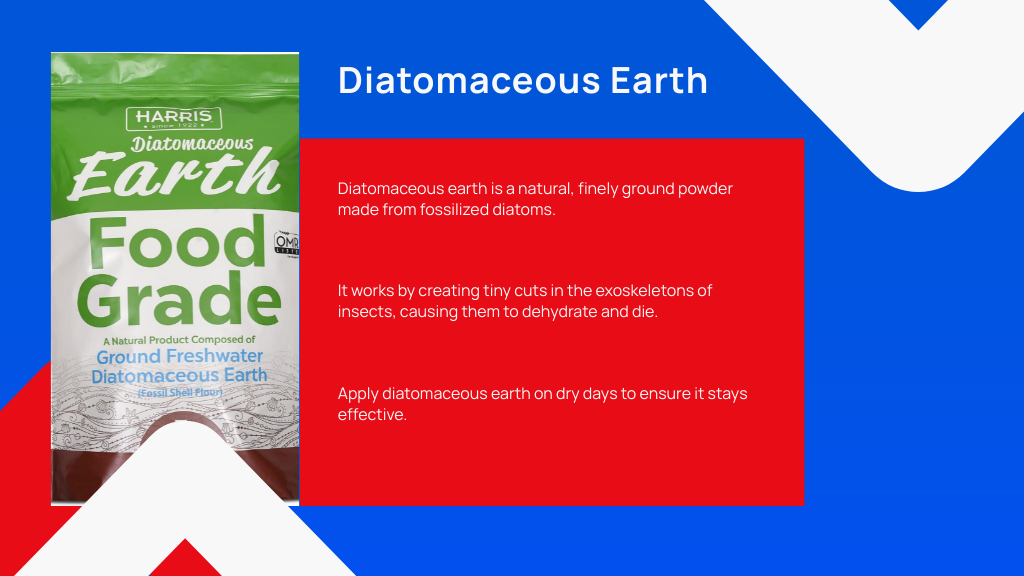
You'll also want to take into account the safety aspects, ensuring you're using it in a way that's effective yet safe for both your garden and household.
Let's examine how you can apply this natural insecticide most effectively and what precautions you should take.
Application Techniques
If you're looking to effectively use diatomaceous earth for mechanical pest control on your plants, it's crucial to master the application techniques.
Start by choosing a dry day, as moisture can lessen its effectiveness. Lightly dust the powder directly onto the foliage and around the stems of your plants. Make sure you're covering both the upper and lower surfaces of the leaves, as pests can lurk anywhere.
For a thorough job, consider using a duster or a fine sieve to get an even spread, mimicking the coverage you'd aim for with a natural bug spray for plants.
Reapply after heavy rain or watering, as diatomaceous earth needs to be dry to work. This method helps control pests without relying on harsh chemicals.
Safety Considerations
After mastering the application techniques of diatomaceous earth, it's equally important to reflect on its safety aspects. As a natural plant pest repellent, diatomaceous earth is generally safe for use around your garden.
However, you should be cautious during the application. It's a fine powder and can irritate your lungs if inhaled, so always wear a mask. Additionally, while non-toxic to humans and pets, it can still dry out your skin, so wearing gloves is advisable.
Be mindful of beneficial insects as well; diatomaceous earth doesn't discriminate and can harm them too. Apply it carefully, targeting only areas where pests are problematic. This way, you'll maximize its benefits without undue harm to the ecosystem around your plants.
Garlic Spray: Natural Repellent Qualities
While garlic is renowned for its robust flavor in cooking, it also possesses powerful natural repellent qualities that can protect your plants from pests. When you're battling aphids, beetles, or caterpillars, using garlic spray can serve as an effective natural bug repellent for plants.
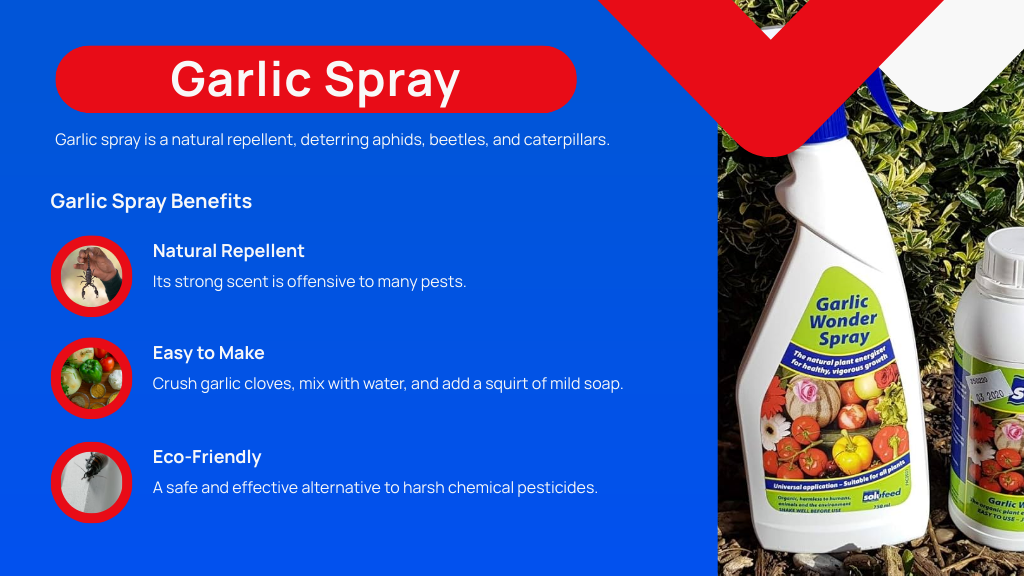
Here's how you can make it: Crush several cloves of garlic and mix them with water, letting the mixture sit overnight. Strain it and add a squirt of mild soap to help the mixture adhere to plant leaves.
Spray it directly onto the foliage where pests frequent. Garlic's strong scent is naturally offensive to many pests, making it a safe, eco-friendly alternative to harsh chemical pesticides.
Remember to reapply after rain.
Pepper Spray: Spicy Deterrent for Insects
Switching gears from garlic, let's talk about how you can use pepper spray as a potent insect repellent for your plants. You'll discover how to prepare this spicy mixture, the best ways to apply it, and the numerous benefits it offers beyond just pest control. It's a straightforward yet effective method to keep your garden thriving and pest-free.

Pepper Spray Preparation
Pepper spray, a powerful natural insecticide, is surprisingly simple to prepare and can be a formidable deterrent against garden pests. To whip up your own homemade bug spray for plants, you'll need only a few ingredients: fresh hot peppers, water, and a bit of dish soap.
Start by chopping up a handful of peppers—capsaicin, the spicy component, is what keeps the bugs at bay. Simmer the peppers in water for about 15 minutes, then let the mixture cool.
Strain it into a spray bottle, adding a few drops of dish soap to help the solution adhere to plant leaves. You've now created an effective and natural solution to protect your garden without harsh chemicals.
Application and Benefits
Once you've prepared your pepper spray, applying it to your plants is straightforward. Simply spray it lightly on the leaves, especially under them, where insects like to hide. Do this in the early morning or late evening to avoid sunburn on your plants.
As a natural pesticide for plants, pepper spray works wonders by deterring a wide range of pests, including aphids, spider mites, and beetles, without introducing harmful chemicals into your garden.
- You'll notice the benefits almost immediately.
- The capsaicin in the peppers acts as a powerful repellent, making your plants less appealing to pests.
- Over time, you'll see healthier growth and fewer damaged leaves.
- It's a simple, effective way to protect your garden using natural resources.
Soap Spray: Simple and Effective
While many commercial pesticides carry harsh chemicals, soap spray stands out as a safe and effective alternative for your garden.
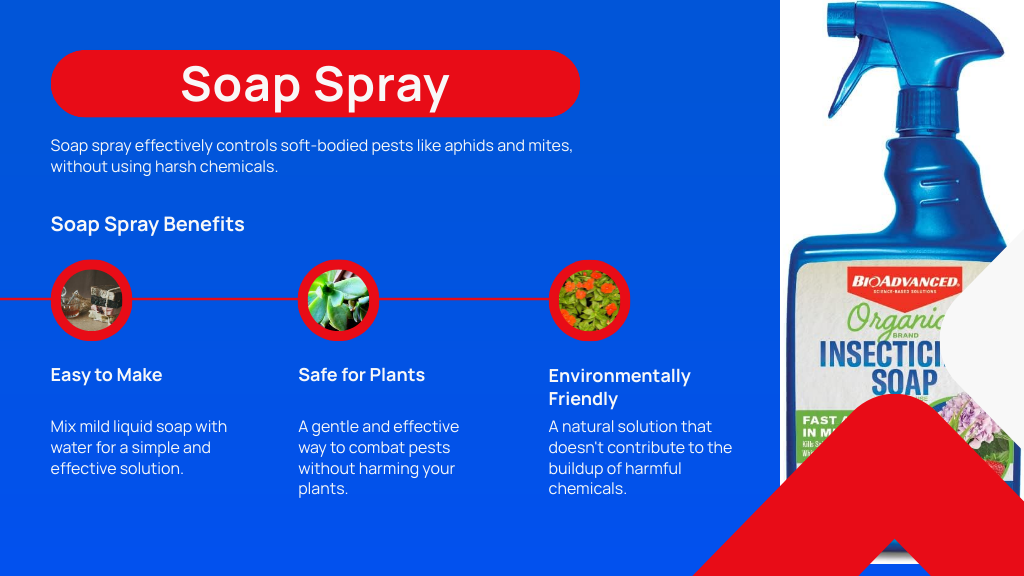
It's a natural bug killer for plants, easy to prepare, and gentle on the environment. To make it, you'll need just mild liquid soap and water. Mix one to two tablespoons of soap per gallon of water. Spray it directly onto the affected plants, targeting the undersides of leaves where pests often hide.
This solution works by breaking down the insects' outer layer, effectively dehydrating them without using toxic substances. You'll notice it's especially effective against aphids, mites, and other soft-bodied pests. Remember to reapply after rain or watering, ensuring your plants stay protected.
Bacillus Thuringiensis (Bt): Biological Warfare
Although less widely recognized than soap sprays, Bacillus Thuringiensis (Bt) serves as a powerful ally in the natural gardener's arsenal against pests. This biological agent targets pest larvae, disrupting their digestive systems upon ingestion and causing death within days.
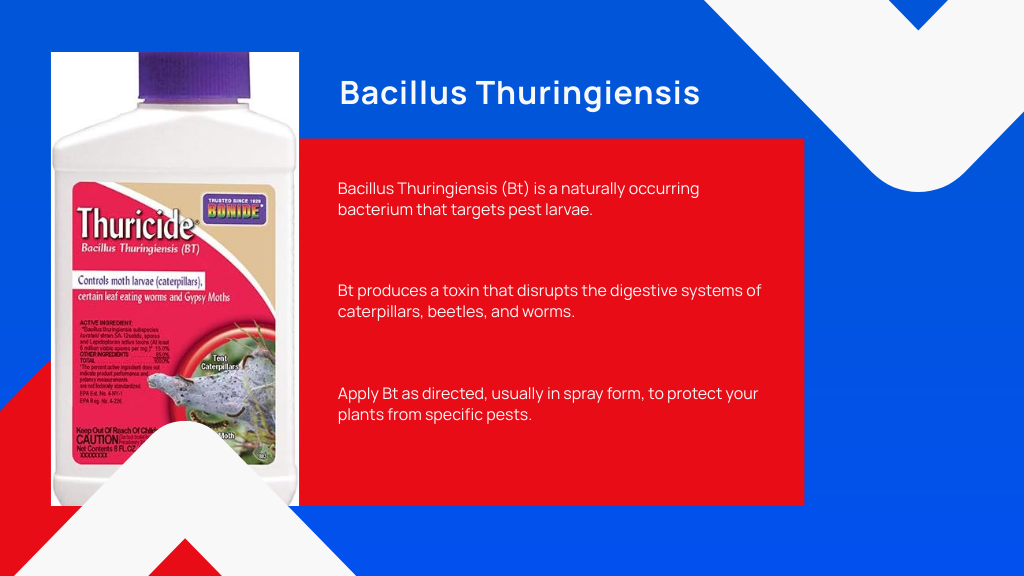
It's a cornerstone among natural pesticides, specifically catering to those of you battling caterpillars, beetles, and various worm species in your garden.
Bt's appeal lies in its specificity; it doesn't harm beneficial insects or the surrounding ecosystem, making it a favorite for integrated pest management. You'll find it particularly effective against cabbage worms and corn earworms, which can devastate crops if left unchecked.
Discover the precision of Bt in safeguarding your garden, targeting only harmful pests without disturbing the ecosystem.
Just apply it as directed, usually in spray form, to protect your plants without resorting to harsh chemicals.
Essential Oils: Aromatic Pest Control
Essential oils aren't just for spa days; they're also potent natural insecticides that can keep pests at bay with their intense aromas.
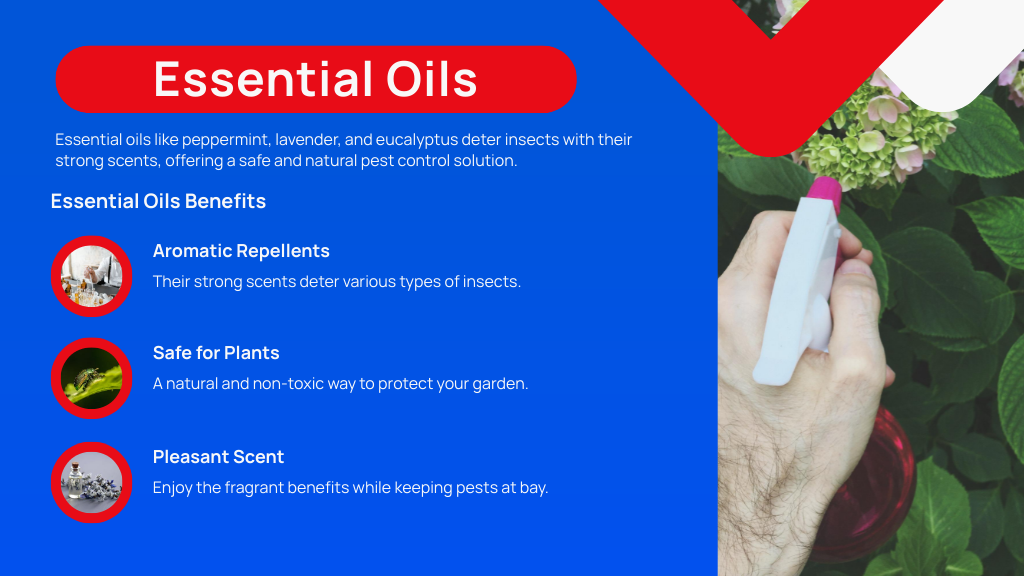
When you're looking for a natural insect repellent for plants, consider using oils like peppermint, lavender, and eucalyptus. These oils not only deter many types of insects with their strong scents but also offer a safe, chemical-free method of protection for your garden.
To apply, mix a few drops of your chosen essential oil with water and a small amount of mild soap, which helps the oil adhere to plant leaves. Spray this mixture directly onto the foliage.
Conclusion
You've got the power to protect your plants naturally! Harness neem oil's versatility, feel the crunch with diatomaceous earth, and embrace garlic's repelling force. Spice things up with pepper spray, keep it clean with soap spray, release biological warfare with Bacillus Thuringiensis, and let essential oils cast their aromatic spell. Together, these natural warriors offer you a robust arsenal against pests. Choose your favorite, or combine them for full-scale defense, and watch your garden thrive organically!
